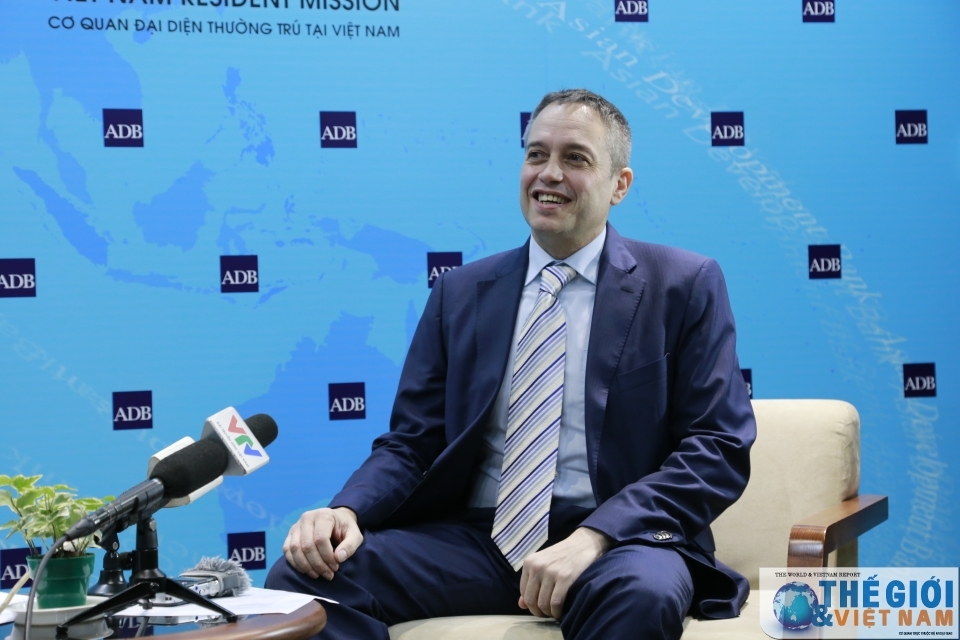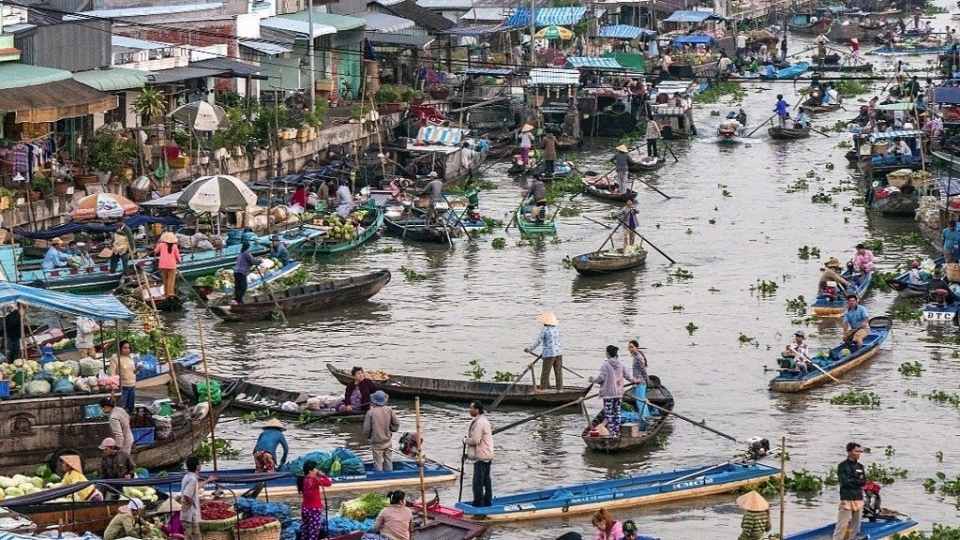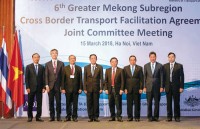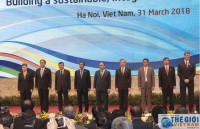
Vietnam - A corridor connecting Mekong Subregion
Latest
| TIN LIÊN QUAN | |
| GMS leaders approved Joint Statement | |
| Sixth Greater Mekong Subregion Summit a success | |
Can you please share some of GMS program’s targets?
The Asian Development Bank (ADB) launched the Greater Mekong Subregion Initiative in 1992 and this year has marked its 25th anniversary. GMS is the most comprehensive cooperation program in the Mekong Region, including Vietnam, Lao PDR, Cambodia, Thailand, Myanmar and China (Guangxi and Yunnan Provinces).
 |
| Alfredo Perdiguero, Director of Regional Cooperation and Operations Coordination Division, Southeast Asia Department, Asian Development Bank (ADB). (Photo: Trung Hieu) |
During 25 years, ADB have assumed the role of the GMS Secretariat as well as roles of a facilitator, financier, honest broker, and technical adviser. We have mobilized about 7 billions USD from ADB for the next five years to support different projects of the GMS Program.
GMS’s top priority is to connect together all six countries to enhance economic development, promote trade and investment. The GMS Plan of Action is based on 3 “C”: to enhance Connectivity, to provide more Competitiveness and to promote the role of Community.
GMS has projects in many areas and achieved great success, such as the development of power inter-connection, tourism and agriculture. Moreover, the task of maintaining the environment to ensure sustainable growth in all six countries is a key factor in all GMS projects.
Among all the areas, transportation is the most important sector. When you look back in 1992, there were almost no roads and infrastructure connecting the countries. Now, thanks to the GMS and other regional programs, all six countries are much better connected and those roads have contributed significantly to creating new opportunities for trade and investment.
Connectivity is in deed very important and specifically transportation in GMS projects, can you evaluate some transportation projects that GMS have carried out in Vietnam and other countries?
One very successful project is the Ha Noi – Lao Cai Expressway and this is one of the most important projects of GMS Program. Before the building of the expressway, it took more than 7 hours to reach the border with China, but now the traveling time has been reduced to approximately 3 hours. This is a significant impact and created enormous opportunities to promote much more trade and investment between Vietnam and China. We have also built roads to facilitate the traffic and link Ho Chi Minh City with Cambodia.
These are just two examples in Vietnam among many other projects in the region. In the case of Vietnam, it is the only country participate in the three main GMS corridors, the North-South corridor that connects Vietnam with China, the East-West corridor connecting Hue-Da Nang with Lao PDR, Thailand and Myanmar, and the Southern economic corridor which bridges Ho Chi Minh City with Phnom Penh and Bangkok. Vietnam is truly a corridor connecting the neighboring countries in the region.
How does ADB assess Vietnam’s contribution in the current GMS program and its prospect in the future?
Vietnam has been a very active member of the GMS Program, leading many initiatives and participated dynamically in almost every sector that GMS is operating in. The government of Vietnam has recognized the benefits that the GMS Program has brought for Vietnam, which is opening new opportunities, borders to connect Vietnam with its neighbors such as Lao PDR, Cambodia and China.
 |
| Soc Trang floating market (by Kieu Anh Dung) - won 1st prize in ADB's photo competition on 25 years of GMS. |
I think by hosting the 6th GMS Meeting (from 29 – 31 March) and the GMS Business Summit (30 March), Vietnam has demonstrated the government’s commitment in the GMS Program.
Moreover, Vietnam has been leading in calling for engagement from not only the public sector but also from the private sector. Therefore, we are very pleased and honored that the Prime Minister has recognized this GMS Business Summit. And thanks to this prioritization, it is able to bring in more energy, ideas and financing from the private sector.
What are the soft spots that Vietnam needs to overcome to better commit to the Program?
I see Vietnam as a very active contributor and there are not many soft spots that I can think of. However, in my opinion, one of the key challenges is how to further promote the involvement of the province authorities into the GMS Program.
Some of the provinces are cooperating very well with the government and ADB has achieved great results. Therefore, Vietnamese government should continue to mobilize provinces’ authorities and the private sector. The Program can bring even more results and benefits if the private sector is more interested in the GMS projects. Accordingly, I think the initiative of the Prime Minister to host the first GMS Business Summit is very significant to the GMS Program.
Besides transportation, what other sectors can we further promote in the future?
The GMS projects in transportation sector is not only about building and maintaining roads, but also ensuring road safety since the number of road accidents are enormous. The Program also looks at developing railways to link with other countries.
We have a list of 7 sectors that are part of the GMS and we need to expand the idea that we have already done in those sectors. One of them is the power sector, we are planning to bring six countries together to improve inter-connection in the energy power system. We also need to ensure a better collaboration in the agriculture sector, to enhance the value chain, increase productivity, and to be more environmental friendly.
Another important sector will be public health. In the recent years, there have been many cases of infectious diseases, and thus all countries need to better prepare themselves. Moreover, the mobility among regional countries is improving, more and more people are migrating to other countries and number of tourist is increasing. As a result, this is posing a great challenge for the public health sector in controlling and preventing diseases.
Urban development also needs a lot of attention. The key factor is all countries are willing to share lesson and experience on how to develop smart cities since they are facing similar challenges regarding the population.
Furthermore, GMS also organized GMS Tourism Forum and GMS Agriculture Forum to attract the interest of private and public entrepreneurial sector, creating opportunity to bring in more ideas and finance from the private sector.
There are still a lot of work that need to be done, we have spent 21 billions USD in 25 years and are aiming at a very ambitious target of mobilizing 66 billions USD for projects in the future.
On the occasion of the GMS Summit, do you have any message that you’d like to convey to the Vietnamese public and government?
I would like to express my gratitude to H.E Prime Minister Nguyen Xuan Phuc and the government of Vietnam, who are working very hard in preparation for this Summit and other events, which will enhance this program even more in the future. The GMS Summit only takes place once every three years and through this, I believe the government will look for concrete results that will benefit the people of the region.
To the Vietnamese people, you are the participant but also the beneficent of this program. The truck drivers now have better and safer roads to travel cross boarders; workers who are operating especially in economic zone have better access to markets; and farmers have a chance to approach sustainable agriculture system.
Thank you!
 | Developing infrastructure to promote transportation connectivity in GMS countries At the 6th meeting of the Joint Committee for the Greater Mekong Sub-Region (GMS) Cross-border Transport Agreement (CBTA) on March 14-15, Vietnamese Deputy Minister of ... |
 | Building GMS, CLV regions of sustainable, prosperous development After three effective working days in Ha Noi from March 29-31, the sixth Greater Mekong Subregion Summit (GMS-6) and the 10th Cambodia-Laos-Vietnam Summit on Development ... |
 | PM: Vietnam commits to realising GMS priorities The Government of Vietnam commits to implementing initiatives of the Greater Mekong Subregion (GMS) and is translating them into reality, Prime Minister Nguyen Xuan Phuc ... |

















